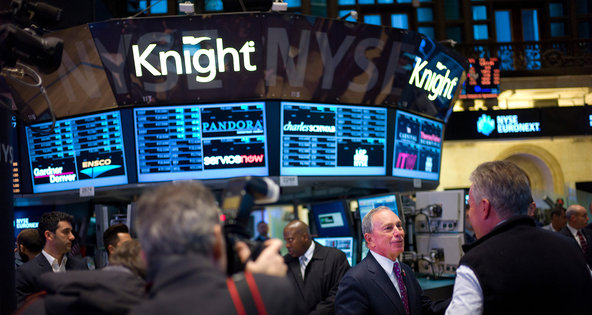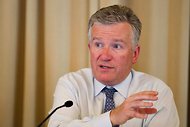The Standard Poor’s 500-stock index closed at its highest level in five years on Friday after a report showed that hiring held up in December, giving stocks an early lift.
The index finished up 7.10 points, at 1,466.47, its highest close since December 2007.
The S. P. 500 began its descent from a record close of 1,565.15 in October 2007, as the early signs of the financial crisis began to emerge. The index bottomed out at 676.53 in March 2009 before staging a recovery during which it has doubled in value and moved within 99 points of its peak.
Despite a halting recovery in the United States economy, the index has climbed steadily as the Federal Reserve has provided huge support to the financial system, buying hundreds of billions of dollars of bonds and holding benchmark interest rates near zero. Last month, the Fed said it would keep rates low until the unemployment rate improved significantly.
“Without the Federal Reserve doing what they did for the last few years, there would be no way you’d be near any of these levels in the index,” said Joseph Saluzzi, co-head of equity trading at Themis Trading. “I would call this the Fed-levitating market.”
The Dow Jones industrial average rose 43.85 points, to 13,435.21. It gained 3.8 percent for the week, its biggest weekly advance since June. The Nasdaq closed at 3,101.66, up 1.09 points.
Stocks surged this week after Congress passed a bill to avoid a combination of government spending cuts and tax increases that had come to be known as the fiscal cliff. The law, passed late Tuesday, averted that outcome, which could have pushed the economy back into recession.
The Labor Department said on Friday that employers added 155,000 jobs in December, showing that hiring held up during the tense fiscal negotiations in Washington. It also said hiring was stronger in November than first thought. The unemployment rate was steady at 7.8 percent.
The report did not give stocks more of a boost because the number of jobs created matched analysts’ forecasts, said J. J. Kinahan, chief derivatives strategist for TD Ameritrade.
“The jobs report couldn’t have been more in line,” Mr. Kinahan said. “The market had more to lose than to gain from it.”
Among stocks making big moves, Eli Lilly Company shares jumped $1.84, or 3.7 percent, to $51.56 after the company said its earnings would beat Wall Street forecasts, even though it will lose United States patent protection for two more product types this year.
Stock in Walgreen, the nation’s largest drugstore chain, fell 61 cents, or 1.6 percent, to $37.18 after the company said that a measure of revenue fell more than analysts had expected in December, even as prescription counts continued to recover.
Share prices may also be benefiting as investors adjust their portfolios to favor stocks over bonds, Mr. Kinahan said. A multiyear rally in bonds has pushed up prices for the securities and reduced the yields that they offer, in many cases to levels below company dividends.
Goldman Sachs reaffirmed its view that stocks “can be an attractive source of income,” and warned that there was a risk that bonds might fall. In a note to clients, the bank said that an index of AAA-rated corporate bonds offered a yield of just 1.6 percent, less than the S. P. 500’s dividend yield of 2.1 percent.
The Treasury’s benchmark 10-year note fell 1/32, to 97 17/32, and the yield fell to 1.90 percent, from 1.91 percent late Thursday.
Article source: http://www.nytimes.com/2013/01/05/business/daily-stock-market-activity.html?partner=rss&emc=rss

